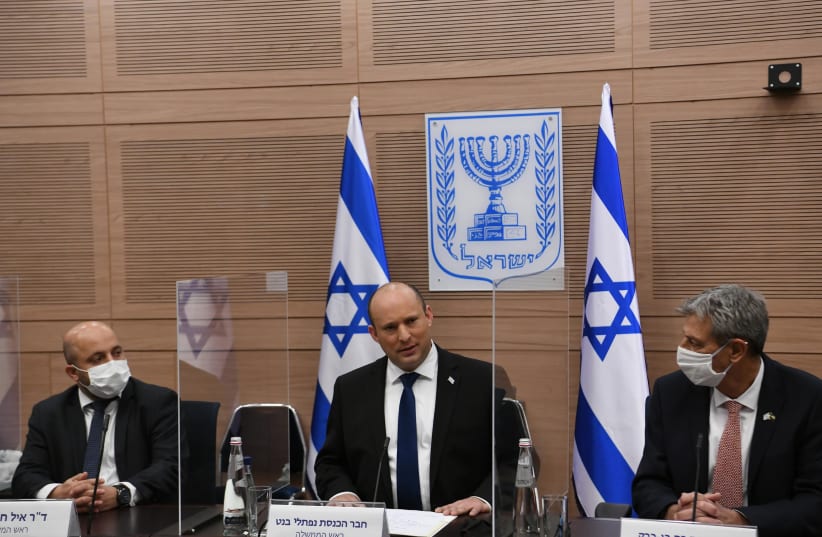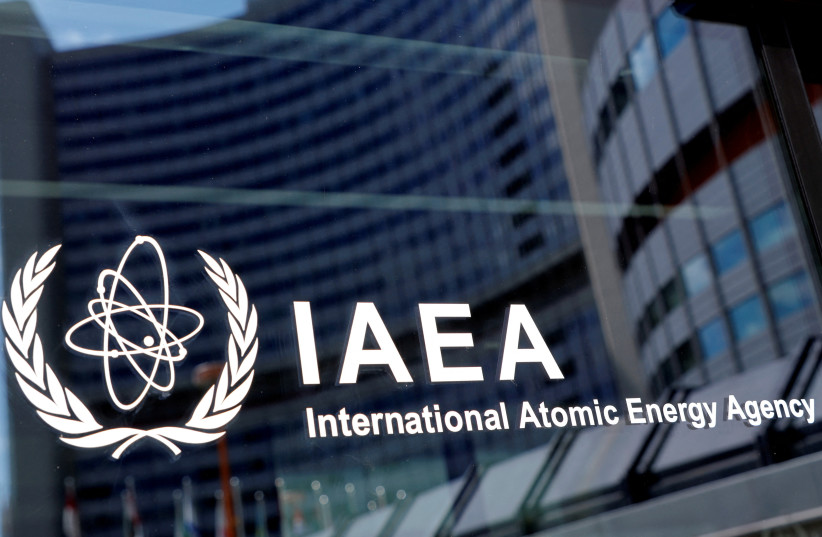Israel will not be constrained by any agreement reached between world powers and Iran in Vienna, Prime Minister Naftali Bennett told the Knesset Foreign Affairs and Defense Committee on Monday.
“It’s important for me to unequivocally clarify: Israel is not a side to the agreements, Israel is not obligated to what is written in these agreements if they are signed, and Israel will continue to maintain full freedom of action at any time or any place, without limitations,” he said, adding that Israel is concerned about the talks.
Iran is at the top of the list of Israel’s challenges, Bennett said, calling the Islamic Republic “the head of an octopus that constantly sends rivals and proxies and its tentacles.”
“We are making a change to an approach of constant offense and not [just] constant defense,” he said.
Israel’s security situation is good and getting better, Bennett told the committee.
“Israel’s systems were in a tailspin for a number of years,” he said. “We stabilized the system and passed a budget. Israel’s economy is strong, with 7% growth, [and] due to this growth, we are taking a lot of money and investing in strengthening the IDF... in a way that we haven’t seen in years. This strengthening is important to our existence.”
Bennett also told the committee Iran is viewed as a regional power, but it has many weaknesses and invests its money in proxies surrounding Israel, rather than in its citizens.
Foreign Affairs and Defense Committee chairman Ram Ben Barak (Yesh Atid) said even though Israel is not obligated to any future Iran deal, it “must wish for an agreement that will prevent Iran from attaining nuclear capabilities, along with restrictions on the development of ballistic missiles, preventing [Iran] from establishing itself in Syria, preventing the transfer of weapons... to Hezbollah and Hamas and stopping its sponsorship of terrorism.
“If those things do not happen, Israel is committed to preparing a backup plan that includes an effective military option to reach Israel’s goals and aims. Israel has the right to defend itself by itself.”
The remarks came as the eighth round of negotiations for Iran and the US to rejoin the 2015 Joint Comprehensive Plan of Action continue in Vienna. The JCPOA, signed in 2015, limited Tehran’s nuclear program, while gradually lifting sanctions. Iran continued its JCPOA violations even during its talks in Vienna, which were renewed on November 29, by launching advanced centrifuges.
Israel has expressed concerns in recent months that the US would reach an interim agreement that would lift most or all of the sanctions on the Islamic Republic since the Trump administration left the deal in 2018, without significantly rolling back Iran’s nuclear program, which has reached 60%-enriched uranium. Weapons-grade uranium is enriched to 90%.
But Iran’s Foreign Ministry on Monday said it would not accept an interim agreement, a day after London-based Rai Al-Youm reported that a two-year deal had been reached, by which the US would lift Trump-era sanctions and Iran’s enriched uranium would be transported to Russia.
Iranian Foreign Ministry spokesman Saeed Khatibzadeh said Iran is “looking for a lasting and credible agreement, and no agreement without these two components is on our agenda.”
“We all need to make sure that the return of the United States [to the JCPOA] is accompanied by verification and the receipt of guarantees, and that a lifting of sanctions must take place,” he said. “These are not achieved by any temporary agreement.”
Asked about the reported interim deal, a US State Department representative said: “Our priority remains reaching and implementing a rapid, mutual return to full compliance with the JCPOA. We will not negotiate in the press or comment on specific claims about the negotiations.”
“There was some modest progress in the talks last week, and we hope to build on that this week,” the representative said. “What is clear is that if we do not soon reach an understanding on mutual return to compliance, Iran’s accelerating nuclear steps will increasingly diminish the nonproliferation benefits of the JCPOA.”
Western parties to the talks with Iran – France, Germany and the UK directly, and the US indirectly – have repeatedly questioned the Islamic Republic’s seriousness in engaging in them, saying they would not allow the talks to drag on.
“The pace of the talks is also important for us,” Khatibzadeh said, “but the other side cannot move like a turtle and expect us to move with the speed of light.”
Ambassador Mikhail Ulyanov, head of the Russian delegation, met with the EU’s coordinator of the talks, Enrique Mora, on Monday and tweeted they had discussed “possible ways and means to expedite negotiations on restoration of JCPOA and sanctions lifting.” That could mean Russia is also dissatisfied with the pace of talks.
Iranian negotiators held separate meetings with Mora and their counterparts from Russia, China and the E3, as the European parties to the JCPOA are known.
They “exchanged views and assessments on the whole spectrum of contentious issues that need to be settled to ensure restoration of the JCPOA and sanctions lifting,” Ulyanov tweeted.
Meanwhile, Germany and the UK appointed new heads of their negotiating teams.
The German delegation will be led by Tjorven Bellmann, the Foreign Ministry’s new political director in Berlin. She has served as press and political officer at the German Embassy in Tehran in the past and served in Israel twice, once as a junior professional for the European Commission delegation in Tel Aviv and once as political officer at the German Embassy there.
Stephani Al-Qaq, the new leading British diplomat in the Vienna talks, is the director of the Foreign Office’s Middle East and North Africa Department.

